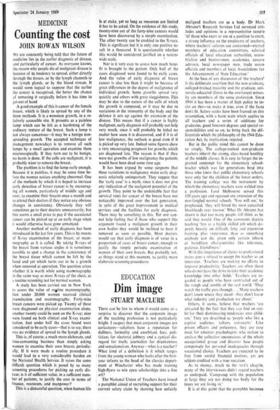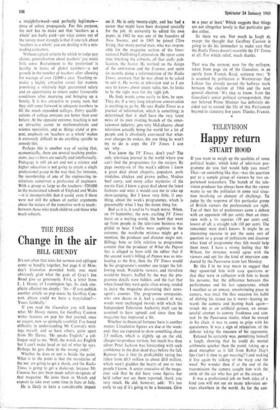Dim image
EDUCATION STUART MACLURE
There can few to whom it would come as a surprise to discover that the corporate image of the teaching profession is not particularly bright. I suspect that most corporate images are caricatures—solicitors have a reputation for dullness, formality and exorbitant fees; poli- ticians for electoral jobbery and a cynical dis- regard for truth; journalists for drunkenness and sensationalism. Anyway—what is a teacher? What kind of a definition is it which ranges from the young woman who looks after the first- year infants to the head of the classics depart- ment at Winchester who has made training high-flyers to win open scholarships into a fine art?
The National Union of Teachers have issued a pamphlet aimed at recruiting support for their current salary claim by showing how unfairly maligned leachers are as a body. Dr Mark Abrams's Research Services Ltd surveyed atti- tudes and opinions in a representative sample 'of those who exert or are in a position to exert, a strong influence on the employers of teachers, where teachers' salaries are concerned—elected members of education committees, salaried officials of Local education authorities, indus- trialists and businessmen, academics, careers advisers, local newspaper men, trade union officials and members of local Associations for the Advancement of State Education.'
At the base of any discussion of 'the teachers' is the deliberate assertion that the non-graduate, colleged-trained majority and the graduate, uni- versity-educated (listen to the overtones) minor- ity are members of the same profession. Since
1944 it has been a matter of high policy to in•
sist on this—to make it true, even if the facts don't fit. Salary scales have been framed on this assumption, with a basic scale which applies to all teachers and a series of additions for graduates, good honours degrees and special re-
sponsibilities and so on, to bring back the dif- ferentials which the philosophy of the 1944 Edu- cation Act, by implication, rejected.
But in the public mind this cannot be done so simply. The college-trained non-graduate teachers inherit the strong, class-based hostility of the middle classes. It is easy to forget the in- grained contempt for the elementary school- teacher which was for generations bred into those who knew that public elementary schools were only for the children of the lower orders.
The training college was the instrument by which'the elementary teachers were welded into a profession. Lord Melbourne sensed this 130 years ago and opposed any extension of the new-fangled normal schools. 'You will see,' he prophesied, 'they will breed the most conceited blockheads ever known.' What Dr Abrams has shown is that too many people still think as he said they would. One of the comments depicts teaching 'less as a highly skilled job which de- pends heavily on difficult, long and expensive training, plus experience. than as something anybody can do. given only certain inborn or hereditary characteristics like tolerance, patience, friendliness.'
With this impatience of claims to professional status goes a refusal to accept the teacher as an innovator. 'Teachers are making no efforts to improve productivity. Teachers are often those who do not have the drive to take their academic knowledge into other fields.' Teachers are re- garded as people who have contracted out of the rough and tumble of the real world. 'They watch the traffic pass through ... Many teachers don't know where they stand—they don't know what industry and production are about.'
Others, it seems, believe that leachers 'are attracted by the fact that they can find an out- let for their domineering tendencies over child-
ren.' They are described as 'people who like a captive audience. talkers, extraverts.' Like
prison officers and policemen, they are easy meat for amateur psychologists who reckon to analyse the collective unconscious of the whole
occupational group and discover how people compensate for personal inadequacies through vocational choice. Teachers are expected to be free from sordid financial motives, yet are seldom credited with a true vocation.
As to money, much to the Nur's chagrin, many of the interviewees didn't regard teachers as underpaid. 'Compared with the population at large they are not doing too badly for the times we are living in.'
It is at this point that the pamphlet becomes a straightforward—and perfectly legitimate— piece of salary propaganda. For this purpose, the NUT has to make out that 'teachers as a whole' are badly paid—yet what comes out of the survey most strongly is that if you talk about 'teachers as a whole' you are dealing with a mis- leading caricature.
Without agreed criteria by which to judge pay claims, generalisation about teachers' pay make little sense. Recruitment to the 'profession' is healthy in terms of global numbers—a net growth in the number of teachers after allowing for wastage of over 12,000 a year. Teaching re- mains a highly attractive career for women, promising a relatively high guaranteed salary and an opportunity to return under favourable conditions after marrying and bringing up a family. It is less attractive to young men, but they still come forward in adequate numbers to fill the much expanded colleges. Entry qualifi- cations of college entrants are better than ever before. At the opposite extreme, teaching is not an attractive career to mathematicians and science specialists, and as things stand at pre- sent, emphasis on 'teachers as a. whole' makes it extremely difficult to do anything specific to remedy this.
Perhaps this is another way of saying that, economically, there are several teaching profes- sions, just as there are socially and intellectually. Pedagogy is still an art and not a science and higher education is not going to create a single professional group in the way that, for instance, the membership of one of the engineering in- stitutions comprises a profession of engineers. With a group as large as the teachers-320,000 in the maintained schools of England and Wales —it is inconceivable that it could, even if there were not still the echoes of earlier arguments about the nature of the transitive verb to teach: between those who teach children and those who teach subjects.



































 Previous page
Previous page